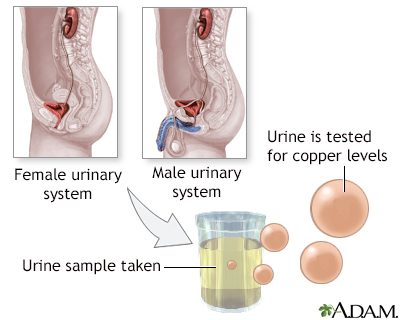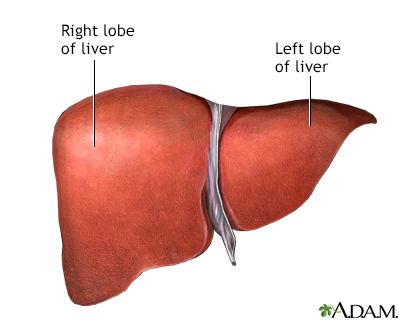Wilson Disease Overview
Learn About Wilson Disease
Wilson disease is an inherited disorder in which there is too much copper in the body’s tissues. The excess copper damages the liver and nervous system.
Wilson’s disease; Hepatolenticular degeneration
Wilson disease is a rare inherited disorder. If both parents carry a defective gene for Wilson disease, there is a 25% chance in each pregnancy that the child will have the disorder.
Wilson disease causes the body to take in and keep too much copper. The copper deposits in the liver, brain, kidneys, and eyes. This causes tissue damage, tissue death, and scarring. The affected organs stop working normally.
This condition is most common in eastern Europeans, Sicilians, and southern Italians, but it may occur in any group. Wilson disease typically appears in people under 40 years old. In children, the symptoms begin to show by age 4.
Symptoms may include:
- Abnormal posture of arms and legs
- Arthritis
- Confusion or delirium
- Dementia
- Difficulty moving arms and legs, stiffness
- Difficulty walking (ataxia)
- Emotional or behavioral changes
- Enlargement of the abdomen due to accumulation of fluid (ascites)
- Personality changes
- Phobias, distress (neuroses)
- Slow movements
- Slow or decreased movement and expressions of the face
- Speech impairment
- Tremors of the arms or hands
- Uncontrollable movement
- Unpredictable and jerky movement
- Vomiting blood
- Weakness
- Yellow skin (jaundice) or yellow color of the white of the eye (icterus)
The goal of treatment is to reduce the amount of copper in the tissues. This is done by a procedure called chelation. Certain medicines are given that bind to copper and help remove it through the kidneys or gut. Treatment must be lifelong.
The following medicines may be used:
- Penicillamine (such as Cuprimine, Depen) binds to copper and leads to increased release of copper in the urine.
- Trientine (such as Syprine) binds (chelates) the copper and increases its release through the urine.
- Zinc acetate (such as Galzin) blocks copper from being absorbed in the intestinal tract.
Vitamin E supplements may also be used.
Sometimes, medicines that chelate copper (such as penicillamine) can affect the function of the brain and nervous system (neurological function). Other medicines under investigation may bind copper without affecting neurological function.
A low-copper diet may also be recommended. Foods to avoid include:
- Chocolate
- Dried fruit
- Liver
- Mushrooms
- Nuts
- Shellfish
You may want to drink distilled water because some tap water flows through copper pipes. Avoid using copper cooking utensils.
Symptoms may be managed with exercise or physical therapy. People who are confused or unable to care for themselves may need special protective measures.
A liver transplant may be considered in cases where the liver is severely damaged by the disease.
Wilson disease support groups can be found at www.wilsonsdisease.org and www.geneticalliance.org.
Life-long treatment is needed to control Wilson disease. The disorder may cause fatal effects, such as loss of liver function. Copper can have toxic effects on the nervous system. In cases where the disorder is not fatal, symptoms may be disabling.
Complications may include:
- Anemia (hemolytic anemia is rare)
- Central nervous system complications
- Cirrhosis
- Death of liver tissues
- Fatty liver
- Hepatitis
- Increased chances of bone fractures
- Increased number of infections
- Injury caused by falls
- Jaundice
- Joint contractures or other deformity
- Loss of ability to care for self
- Loss of ability to function at work and home
- Loss of ability to interact with other people
- Loss of muscle mass (muscle atrophy)
- Psychological complications
- Side effects of penicillamine and other medicines used to treat the disorder
- Spleen problems
Liver failure and damage to the central nervous system (brain, spinal cord) are the most common and dangerous effects of the disorder. If the disease is not caught and treated early, it can be fatal.
Call your provider if you have symptoms of Wilson disease. Call a genetic counselor if you have a history of Wilson disease in your family and you are planning to have children.
Genetic counseling is recommended for people with a family history of Wilson disease.



Published Date: July 21, 2020
Published By: Anna C. Edens Hurst, MD, MS, Assistant Professor in Medical Genetics, The University of Alabama at Birmingham, Birmingham, AL. Review provided by VeriMed Healthcare Network. Also reviewed by David Zieve, MD, MHA, Medical Director, Brenda Conaway, Editorial Director, and the A.D.A.M. Editorial team.
National Institute of Diabetes and Digestive and Kidney Diseases website. Wilson disease. www.niddk.nih.gov/health-information/liver-disease/wilson-disease. Updated November 2018. Accessed November 3, 2020.
Roberts EA. Wilson disease. In: Feldman M, Friedman LS, Brandt LJ, eds. Sleisenger and Fordtran’s Gastrointestinal and Liver Disease. 11th ed. Philadelphia, PA: Elsevier; 2021:chap 76.
Schilsky ML. Wilson disease. In: Goldman L, Schafer AI, eds. Goldman-Cecil Medicine. 26th ed. Philadelphia, PA: Elsevier; 2020:chap 200.
Sarah Bush Lincoln Health Center
Mohsin Ali is a Sleep Medicine specialist and a Neurologist in Watertown, New York. Dr. Ali and is rated as an Advanced provider by MediFind in the treatment of Wilson Disease. His top areas of expertise are Wilson Disease, Menkes Disease, Familial Benign Copper Deficiency, and Progressive Myoclonic Epilepsy.
Kristen Nadeau is a Pediatric Endocrinologist and an Endocrinologist in Aurora, Colorado. Dr. Nadeau and is rated as an Advanced provider by MediFind in the treatment of Wilson Disease. Her top areas of expertise are Type 2 Diabetes (T2D), Type 1 Diabetes (T1D), Obesity, Polycystic Ovary Syndrome, and Sleeve Gastrectomy. Dr. Nadeau is currently accepting new patients.
Marian Rewers is a Pediatric Endocrinologist and an Endocrinologist in Aurora, Colorado. Dr. Rewers and is rated as an Advanced provider by MediFind in the treatment of Wilson Disease. His top areas of expertise are Type 1 Diabetes (T1D), Diabetic Ketoacidosis, Malabsorption, and Diabetic Nephropathy. Dr. Rewers is currently accepting new patients.
Summary: The Family Investigation of Nephropathy and Diabetes (FIND) is a multicenter study designed to identify genetic determinants of diabetic kidney disease. FIND will be conducted in eleven centers and in many ethnic groups throughout the United States. Two different strategies will be used to localize genes predisposing to kidney disease: a family-based genetic linkage study and a case-control study ...
Summary: This registry concerns adults and children with Wilson's disease. The collection of a large amount of data will allow a better understanding of the epidemiology of this rare disease, in particular the age of onset according to the hepatic or hepato-neurological forms, but also the geographical distribution of patients consulting in France. This database will also make it possible to know all the t...